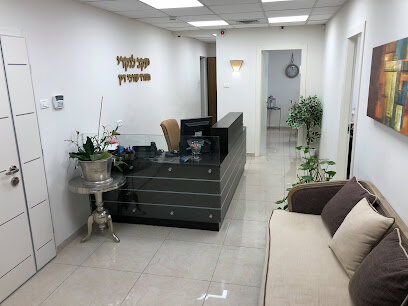Best Real Estate Lawyers in Afula
Share your needs with us, get contacted by law firms.
Free. Takes 2 min.
Free Guide to Hiring a Real Estate Lawyer
List of the best lawyers in Afula, Israel
About Real Estate Law in Afula, Israel:
Afula is a regional city in northern Israel with a mix of older neighborhoods, new residential development and surrounding agricultural and public land. Real estate transactions in Afula follow the same national legal framework used throughout Israel, but local matters - such as municipal planning, building permits and municipal taxes - are handled by Afula Municipality and local planning committees. Key elements of real estate law in Israel include land registration (Tabu), the role of the Israel Land Authority when state or public land is involved, municipal planning and building regulations, and national tax and conveyancing rules that affect buyers, sellers, landlords and developers.
Why You May Need a Lawyer:
Real estate deals involve substantial sums and multiple legal risks. A lawyer experienced in Israeli real estate law can protect your interests at important stages:
- Buying or selling residential property - to review title, contract terms and required disclosures.
- Purchasing new construction or off-plan units - to review developer contracts, escrow arrangements, completion dates and warranties.
- Mortgage financing - to review lender conditions, coordinate registration of the mortgage and verify loan documents.
- Commercial property deals - to negotiate leases, purchase agreements, zoning and planning conditions and corporate aspects.
- Disputes about boundaries, easements, defects, unpaid communal charges or conflicts with a vaad bayit - to demand remedies, negotiate settlements or litigate.
- Transfer by inheritance, divorce settlement or company restructuring - to handle probate, tax planning and transfers of title.
- Dealing with municipal planning, building permits or enforcement - to obtain permits, respond to demolition or enforcement orders, or seek variances.
Local Laws Overview:
This overview highlights the most relevant legal areas that affect real estate in Afula:
- Land Registration - Tabu: Title to land and property interests are recorded in the Tabu (Land Registry). A Tabu extract shows ownership, mortgages, liens and encumbrances. Checking the Tabu is a fundamental step before any purchase.
- Israel Land Authority and Public Land: Large tracts in Israel are state land or held by public bodies. Leases from the Israel Land Authority or from public organizations can have special terms - often long-term leaseholds rather than freehold ownership - and may require approvals for transfers.
- Planning and Building Regulations: National, regional and local plans govern permitted uses, density, building heights and construction rights. Afula Municipality and its local planning committee administer local outline plans and building permits. Unauthorized construction can lead to fines, orders to correct or orders to demolish.
- Purchase Process and Contracts: Purchase agreements typically include reservation deposits, conditions precedent (for financing, due diligence), closing dates and allocation of costs. Lawyers often draft or review these agreements and the transfer documents presented to the Tabu.
- Mortgages and Security: Mortgages and other security interests are registered in the Tabu. Lenders require registration and lawyers usually coordinate mortgage documentation and its recording.
- Taxes and Municipal Charges: Key taxes include purchase tax (mas rechisha), capital gains tax (mas shevach) on sales, and municipal property tax - arnona. Rates and exemptions vary by purchaser type, property's use and holding period.
- Condominiums and Vaad Bayit: Apartments in a shared building are governed by bylaws and decisions of the vaad bayit (homeowners association). Financial obligations, maintenance and reserves are important considerations when buying a unit.
- Consumer Protections for New Apartments: Israeli law includes rules for escrow accounts, developer obligations and disclosures for new projects, but contract terms can be complex and require legal review.
Frequently Asked Questions
How do I check who owns a property in Afula?
Request a Tabu extract for the property - this is the authoritative land registry record showing the legal owner, mortgages, liens and restrictions. A lawyer or licensed conveyancer can obtain and interpret the extract, and advise if additional checks are needed such as municipal records or planning restrictions.
What are the main steps when buying a house or apartment?
Common steps include: finding the property, signing a reservation or purchase agreement with deposit and conditions, performing due diligence (Tabu search, checking debts and arnona, building permits and vaad bayit status), obtaining mortgage approval if needed, finalizing the purchase contract, paying taxes and fees, and registering the transfer in the Tabu. A lawyer should review or prepare documents and handle registration.
What costs should I expect beyond the purchase price?
Expect purchase tax, legal fees, notary fees if any, registration fees for the Tabu, survey or appraisal fees, bank fees for mortgage setup, real estate agent commission if applicable, and municipal charges such as arnona. If buying a new property you may also face expenses for connecting utilities and finishing works.
Can foreigners buy property in Afula?
Foreigners can buy property in many parts of Israel, but different rules and approvals can apply - for example when state or Israel Land Authority land is involved. Tax consequences for foreign buyers may differ. It is essential that foreign buyers obtain local legal and tax advice before committing to a purchase.
How do I know if there are planning or building restrictions affecting a property?
Ask for current planning documents and a statement from Afula Municipality about the property zoning and any pending or approved plans affecting it. A lawyer or planning consultant can check national and local plans, building permits and open enforcement cases to identify restrictions or future development that could affect use or value.
What should I check when buying an apartment in a shared building?
Review the vaad bayit records - minutes, accounts, maintenance history and outstanding debts. Check the bylaws, the condition of common areas and any ongoing or planned projects that may require special payments. Confirm whether there are court orders, special assessments or building violations.
What taxes will I face when I sell a property in Afula?
Sellers may be liable for capital gains tax on the sale depending on ownership history, exemptions and the calculation method. There may also be municipal and transaction-related costs. Tax rules are complex and change frequently - consult a tax advisor or lawyer to determine likely liability and possible exemptions.
What happens if the property has an existing mortgage or lien?
Existing mortgages and liens appear on the Tabu. On purchase, the buyer and seller must agree who pays off encumbrances. Typically, the seller clears mortgages at closing and the buyer receives a clean title. Lawyers coordinate payoffs and ensure liens are removed from the Tabu after closing. In some transactions lenders may consent to assignments or subordination.
How long does a typical purchase transaction take?
Timelines vary. A straightforward resale transaction with mortgage can take several weeks to a few months - to negotiate the contract, complete due diligence and obtain financing. New construction purchases can take much longer because of staged construction, developer schedules and longer contractual complexity. Delays are common, so build flexibility into any schedule.
What can I do if a neighbor claims a boundary or easement over my property?
Boundary and easement disputes can be resolved by negotiation, mediation, or court action. A surveyor can prepare an accurate boundary survey, and a lawyer can review the Tabu and title documents and advise on legal rights and remedies. Prompt legal action is important to protect your interests and to avoid escalation.
Additional Resources:
Below are organizations and authorities that are useful when dealing with real estate matters in Afula. Contact these bodies for official records, permits or guidance - and consult a qualified lawyer for legal advice.
- Afula Municipality - planning and building department and arnona (municipal tax) office.
- Land Registration Office - Tabu records for title and encumbrances.
- Israel Land Authority - for state and public land matters and lease conditions.
- Ministry of Construction and Housing - national housing and construction policy and regulations.
- Israel Tax Authority - for purchase tax, capital gains and other tax matters.
- Israel Bar Association - for locating licensed real estate lawyers and guidance on legal standards.
- Licensed surveyors and engineers - for boundary surveys, plans and inspections.
- Vaad Bayit associations and consumer advocacy groups - for condominium governance and homeowner concerns.
Next Steps:
If you need legal assistance with real estate in Afula, follow these practical steps:
- Gather documents - property address, any contract, Tabu extract if available, current arnona receipts, plans, developer documents and any notices from the municipality or vaad bayit.
- Consult a local real estate lawyer - look for experience with the specific type of transaction - residential resale, new construction, commercial property or planning disputes. Ask about fees, scope of service and timeline.
- Order due diligence - a lawyer will obtain a current Tabu extract, municipal status, plans and checks for liens, mortgages and enforcement orders.
- Coordinate financing and taxation - contact your bank for mortgage pre-approval and a tax advisor for purchase or sale tax implications.
- Negotiate and finalize the contract - have your lawyer review or draft the agreement and advise on conditions, deposit, closing obligations and remedies for breach.
- Close and register - finalize payment, ensure taxes and fees are paid, and have your lawyer register the transfer and any mortgage in the Tabu.
Real estate transactions are significant legal steps. Engaging an experienced local lawyer early can prevent costly problems and clarify your rights and obligations in Afula.
Lawzana helps you find the best lawyers and law firms in Afula through a curated and pre-screened list of qualified legal professionals. Our platform offers rankings and detailed profiles of attorneys and law firms, allowing you to compare based on practice areas, including Real Estate, experience, and client feedback.
Each profile includes a description of the firm's areas of practice, client reviews, team members and partners, year of establishment, spoken languages, office locations, contact information, social media presence, and any published articles or resources. Most firms on our platform speak English and are experienced in both local and international legal matters.
Get a quote from top-rated law firms in Afula, Israel — quickly, securely, and without unnecessary hassle.
Disclaimer:
The information provided on this page is for general informational purposes only and does not constitute legal advice. While we strive to ensure the accuracy and relevance of the content, legal information may change over time, and interpretations of the law can vary. You should always consult with a qualified legal professional for advice specific to your situation.
We disclaim all liability for actions taken or not taken based on the content of this page. If you believe any information is incorrect or outdated, please contact us, and we will review and update it where appropriate.
Browse real estate law firms by service in Afula, Israel
Afula, Israel Attorneys in related practice areas.










